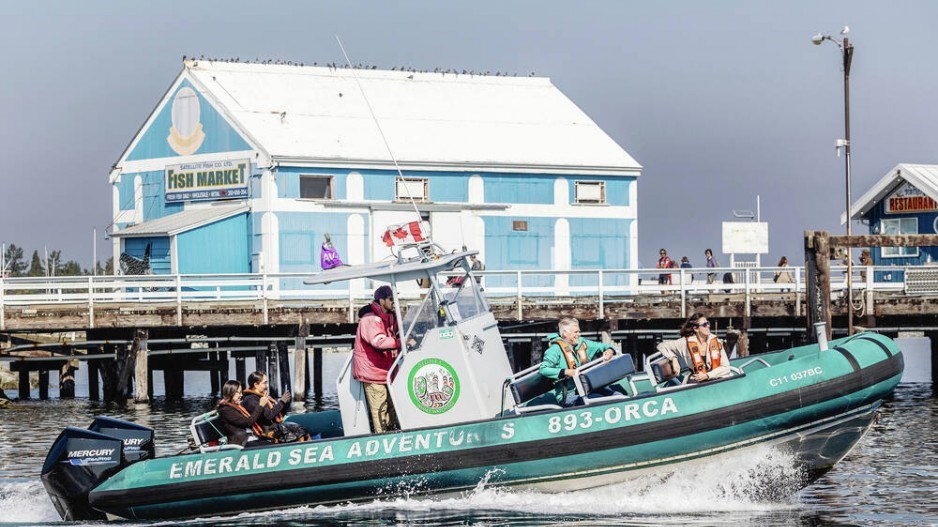The Tsawout First Nation on the Saanich Peninsula has set up a new corporation with a Surrey-based construction company to generate self-sufficiency through training programs and the creation of jobs.
Prior to that deal, the nation bought a Sidney-based wildlife and whale-watching company in the spring. It continues to work with a seaweed cultivation company and is in the midst of talks for potential ventures in other sectors.
“Look out world,” Chief Abraham Pelkey said Friday during a celebration in Sidney to mark the acquisition of the whale-watching company.
Chrissy Chen, negotiator and fisheries manager for the nation, said if other businesses want to partner with the Tsawout, “we are ready.”
At the core is a desire to look ahead seven generations, Pelkey said. That means creating a sustainable future for young people within the nation of approximately 1,400.
These endeavours are a way to express the nation’s sovereignty, he said.
“I’m trying to also encompass education in it all and in our way of life.”
After a year and a half of talks, the Tsawout Nation and Industra Construction Corp. of Surrey signed papers to form Tetcele ICC Construction Corp. The new corporation is owned 51 per cent by the Tsawout and 49 per cent by Industra, a company that has worked extensively in the private and public sector.
Tetcele is a First Nations name for the kingfisher bird.
Pelkey expects Tsawout members will be employed in jobs such as carpenters and labourers and work up to others including estimating and management.
Chen said working with Industra will mean the new corporation can access everything from equipment to expertise and experienced workers.
There are already a number of skilled trades within the nation who could work on corporation projects, she said.
As far as future prospects, it is common for First Nations to want to work with other First Nations companies on projects, Chen said.
She believes the new corporation sets the stage for broader opportunities.
“This partnership, Tsawout First Nation and Industra Construction Corp., will lead to more economic development opportunities and other potential partnerships with other industries and businesses in the future.”
Scot Brydon, chief executive of Industra and co-founder, sees a number of advantages to working with the TsawoutNation through Tetcele, calling it a “win-win.”
“We are going to push our efforts and make it a success.”
Industra has branch offices in locations such as Victoria, Yellowknife and Toronto.
The nation has upcoming projects on its own land and the new corporation can service the community with in-house construction service at a lower cost, Brydon said.
He anticipates bidding on opportunities which are first made available to First Nations corporations. As well, the federal government will set aside work for Aboriginal companies, he said.
Private sector employers may approach First Nations companies if they are looking at major industrial development on traditional lands.
The idea of education is embedded in the goals of the new corporation. “We can provide skills training, safety training, construction management training to Tsawout so that we can further develop their people,” Brydon said.
Pelkey said that the seaweed and whale-watching businesses align with the nation’s cultural and moral values to be good stewards of the land and waters.
These show young people the efforts that are underway to be good stewards and places the nation’s activities in its traditional area, he said.
“It is paving the way for the future in a modern-day context.”
That will include a new name — not yet chosen — for the whale watching company, said Pelkey.
Mike Child bought Sidney Whale Watching in 2000 and was ready for a change in direction. He bumped into Chen and that led to the sale. “It’s a new venture for them so we agreed to help with the transition.”
“As they get more and more comfortable with the operations, they’ll start putting their own stamp on it,” he said.
Working on a wildlife and whale-watching boat is a good introduction and stepping stone for those who want to join the marine sector, he said.
The company has two 12-passenger boats. Chen said several Tsawout members already hold marine-related credentials and training is ongoing.
Elders can go out and mentor young people, talking about the history of their ecological knowledge, something of huge importance to share with the next generation, she said.
The business can incorporate First Nations culture and history in its offerings.
A commitment to supporting green ventures saw the Tsawout Nation grant a licence to Cascadia Seaweed in 2021 to set up a farm seeding and harvesting in the nation’s territorial waters off James Island.
Cascadia is growing sugar kelp and aleria seaweed on seven hectares.
>>> To comment on this article, write a letter to the editor: [email protected]




